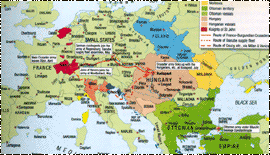| |


|
|

| |
1
OF 3 |
 |
As the two European alliance systems drew
closer to war in 1914, Enver's pronounced pro-German sympathies,
shared by many in the military and bureaucracy, prevailed over the
pragmatic neutrality proposed by Talat and Cemal. Germany had been
pro-Ottoman during the Balkan wars, but the Porte had no outstanding
differences with either Britain or France in the summer of 1914.
In guiding his government toward alignment with Germany, Enver was
able to play on fear of the traditional Ottoman enemy, Russia, the
ally of Britain and France in the war.
 |
On August 2, 1914, Enver concluded a secret
treaty of alliance with Germany. General mobilization was ordered
the next day, and in the following weeks concessions granted to
foreign powers under the capitulations were canceled. It remained
for Germany, however, to provide the casus belli. Two German military
vessels--the battleship Göben and the heavy cruiser Breslau
--that had been caught in a neutral Ottoman port when war broke
out in Europe were turned over to the Ottoman navy. In October they
put to sea with German officers and crews and shelled Odessa and
other Russian ports while flying the Ottoman flag. Russia declared
war on the Ottoman Empire on November 5, followed the next day by
Britain and France. Within six months, the Ottoman army of about
800,000 men was engaged in a four-front war that became part of
the greater conflict of World War I.
Enver launched an ill-prepared offensive in
the winter of 1914-15 against the Russians in the Caucasus, vainly
hoping that an impressive demonstration of Ottoman strength there
would incite an insurrection among the tsar's Turkish-speaking subjects.
Instead, a Russian counteroffensive inflicted staggering losses
on Ottoman forces, driving them back to Lake Van. During the campaign
in eastern Anatolia, assistance was given to the Russians by some
Armenians, who saw them as liberators rather than invaders. Armenian
units were also part of the Russian army. Enver claimed that an
Armenian conspiracy existed and that a generalized revolt by the
Armenians was imminent. During the winter months of 1915, as the
shattered Ottoman army retreated toward Lake Van, a massive deportation
of as many as 2 million Armenians was undertaken in the war zone.
It shortly degenerated into a massacre, as ethnic Turks and Kurds
descended on Armenian villages or slaughtered refugees along the
road. The most conservative estimates put the number of dead at
600,000, but other sources cite figures of more than 1 million.
The situation of those Armenians who survived the march out of Anatolia
was scarcely improved under the military government in Syria. Others
managed to escape behind Russian lines. The episode occasioned a
revulsion in Western Europe that had its effect in the harsh terms
meted out by the Allies in the postwar settlement.
| |
1
OF 3 |
 |
|
|


